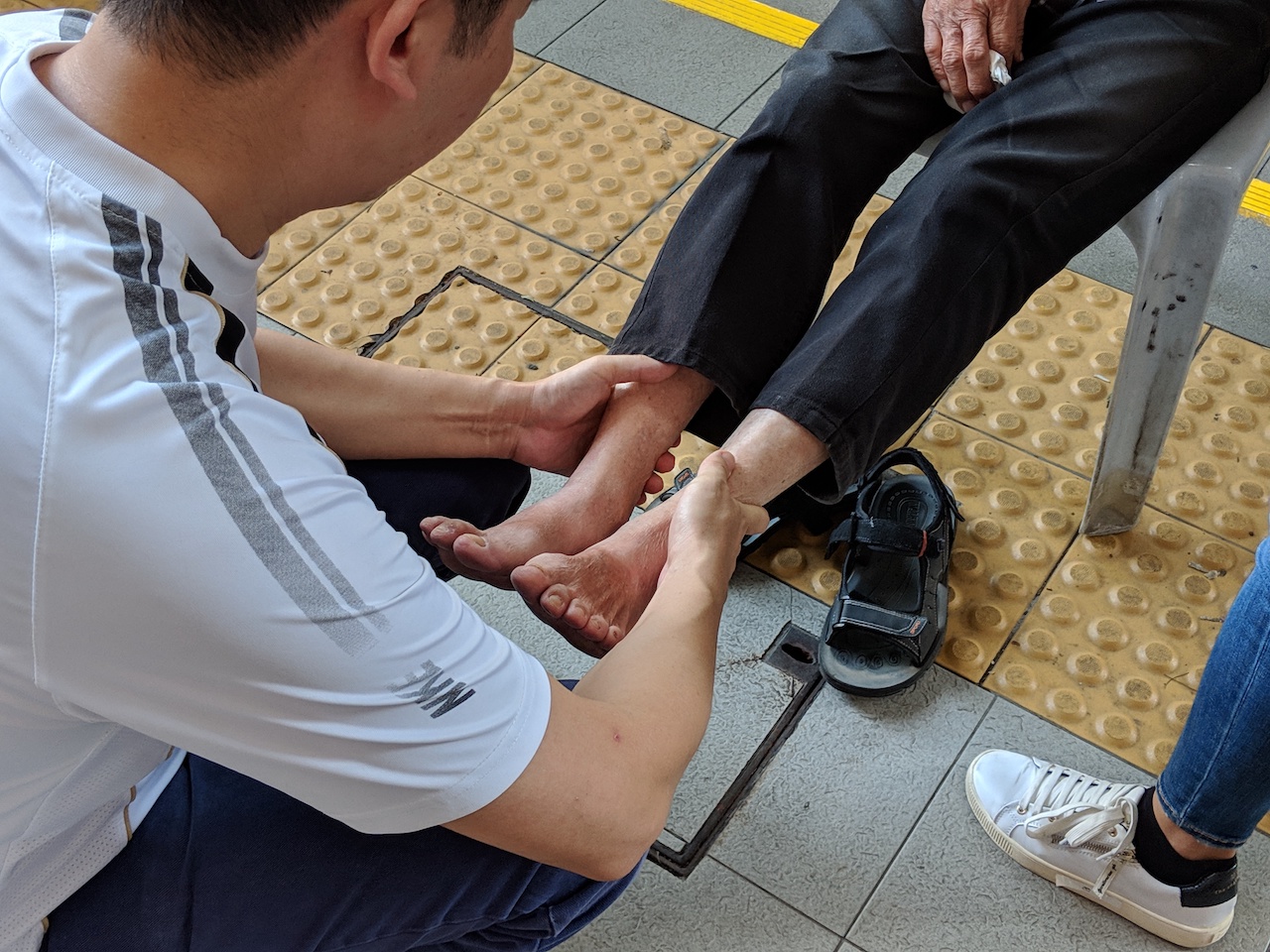Last year, a Christian friend emphatically expressed that she hoped to purchase a resale flat with her fiancé, because resale flats were generally bigger than newer Build-to-Order (BTO) units. The larger space would allow her to turn her house into a home ministry.
As someone who is as Christian as Singapore is a democracy, I assumed a “home ministry” was simply an updated term for “cell group”, and didn’t bother to clarify.
Shortly after, I found out that a cousin and his fiancée had also been attending a home ministry for some time. According to them, this home ministry wasn’t as authoritarian as the church, and they hinted at a more progressive way of practising the religion.
I recalled a New Yorker article from last year about millennial evangelicals returning to the teachings of Jesus, without the taint of “conservative politics” which older evangelicals have taken on. The article opined that more millennial Christians were advocating for causes “not typically associated with the evangelical movement”, such as the acceptance of the LGBT community.
And so I wondered if this were happening in Singapore as well.

When a recent interviewee invited me for a session in a home ministry she attends, I immediately agreed. Her home ministry ‘replaces’ traditional Sunday church visits; the ministry gathers at a member’s home every Saturday evening to partake in worship and bible study, leaving Sunday mornings free for each member to spend with their families.
During the session I attended, the group shared personal experiences with each other in reference to that day’s bible chapter (1 Peter). There were only about nine of us, and there was no pastor or ‘leader’ to dictate that day’s key messages, allowing the group to engage in candid and intimate dialogue with each other.
That night, we were sprawled on the living room floor and on the sofa. The lyrics of the worship songs and the cartoons that we discussed were broadcasted via Apple TV. All in, this wasn’t something I’d witnessed in a typical Sunday service, which has always felt to me like a one-way lecture. It felt more like a gathering of friends.
On top of the seeming rise of home ministries, this gradual shift away from the church and towards Christ’s values reflects the disillusionment that an increasing number of people seem to have with mainstream, institutionalised religion. Home ministries, or their equivalent, also seem to be the perfect avenue for backsliders who are looking to ease their way back into religion, especially if they’d originally left their church because they no longer agreed with its conservative values.
Still, I remained skeptical. How did the lack of an institutional setting, and the apparent absence of hierarchy and tradition, truly translate into greater inclusivity and acceptance of those who didn’t believe in God? Could moving beyond the four walls of the church fundamentally change the way Christianity is practised?
The short answer: Yes and no.

The longer answer finds me spending two blistering Sundays on the steps of Chinatown Complex Food Centre with Christians from Soakability, who are attempting to pray for the elderly.
In my quest to track down someone to explain the concept behind home ministries, I am put in touch with Jeff Yuen, Soakability’s pastor and founder. Even though he once founded another home ministry over a decade ago, his current church now operates from its own public venue.
But less important than its physical space are the values and practices that constitute its foundation.
Feeling burnt out from the traditional church’s approach to Christianity, Jeff took a six-month trip around Asia, visiting places like Yunnan, Xinjiang, Tibet, India, Nepal, and Myanmar. The trip helped him see that worship could be expressed in better, more relational methods, instead of merely listening to a person preach to an audience of hundreds in a church.
“I’d read the bible, and saw inconsistencies in how Jesus behaved versus how the traditional church behaved. Jesus is a friend of sinners, yet the world doesn’t believe the church welcomes sinners. The only times I saw miracles was on a mission trip a few years ago, so this six-month trip was a personal journey I needed to embark on,” he shares.
Soon after returning to Singapore, Jeff founded Soakability, whose name stems from the ability to receive from God (i.e. soak in like a sponge); he believes Christians should learn how to receive from God before giving. In contrast, Jeff points out, religion traditionally asks us to first give to God in order to receive from him.
“We’re always told to try hard to love another, but if we receive well, we will give well,” he explains.
The church is also built on the very idea of community outreach. This means “going out on the streets just to love people, pray for people”, with no intention of bringing them to church. Their outreach sessions, frequently held at places like Chinatown, Waterloo, Bugis, and Little India, do exactly that.
To Jeff, encountering Jesus before one encounters organised religion is key.
“Religion says you need to change your attitude and believe in Jesus before you are accepted, but Jesus says that you are already accepted. You already belong. That’s my whole church’s philosophy,” he says.
I quickly learn that “traditional Christians” apparently find this concept wholly radical, which explains why Jeff admits it can be tricky to navigate his stance on religion with his more conservative friends.
For instance, Jeff once prayed for a gay man’s health when he was in Thailand. According to him, the man had come to him barely over 30 kg, but was back to a healthy weight of more than 70 kg within six months. Jeff’s Christian friends gave him flak for not bringing the man to church, and implied that he should have gotten another person to help him with the man’s ‘sin’.
Even though the man is “still gay, still probably sleeping around”, Jeff doesn’t see a problem “because he’s still alive”. To Jeff, that is infinitely more important than asking him to come to church; when the relationship becomes transactional, there cannot be unconditional love.
“[Christians] seem to be very good at talking but very bad at demonstrating [this love]. In any case, if people are curious enough what we’re about, they’ll find a way to ask,” he reiterates.
Then, he invites me to join his team for an outreach session at Chinatown so I can witness this very love in action.
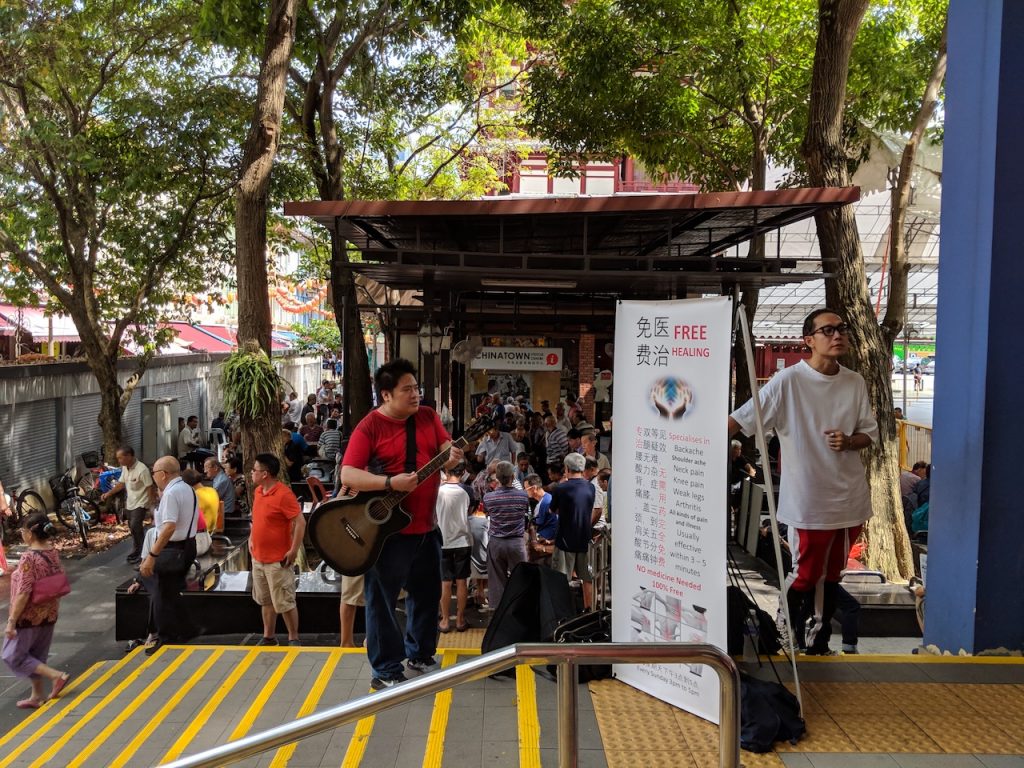
The first Sunday I’m at Chinatown Complex Food Centre, I hover awkwardly on the outskirts of the group, half expecting an elderly person to ask me to cure a physical ailment. It wouldn’t be an unexpected request; on a standee at the edge of the steps to the centre, Soakability’s bilingual poster reads that they offer “FREE healing” for a range of physical ailments, such as back aches, neck pains, knee pains, and so on.
I’m curious to experience this healing firsthand, so I ask a couple of them sincerely, “Do you heal emotional and mental stress?”
Alas, I am told, they do not. I suppose when you’re as busy as Jesus, you have to be selective with your patients.
As it turns out, the ‘healing’ process is quite straightforward: after getting a gist of where the pain points are, a few members hover their hands over the area. Then they say a prayer, asking God to heal this pain. If it persists, they repeat this process until the person feels better, or until the pain has supposedly gone away.
This appears to be a faith healing, even though they ensure never to preach their faith throughout the process. Furthermore, they don’t claim to be medical professionals, and remind the elderly to seek medical treatment if necessary.
All the same, it’s enough to fire up my scepticism.
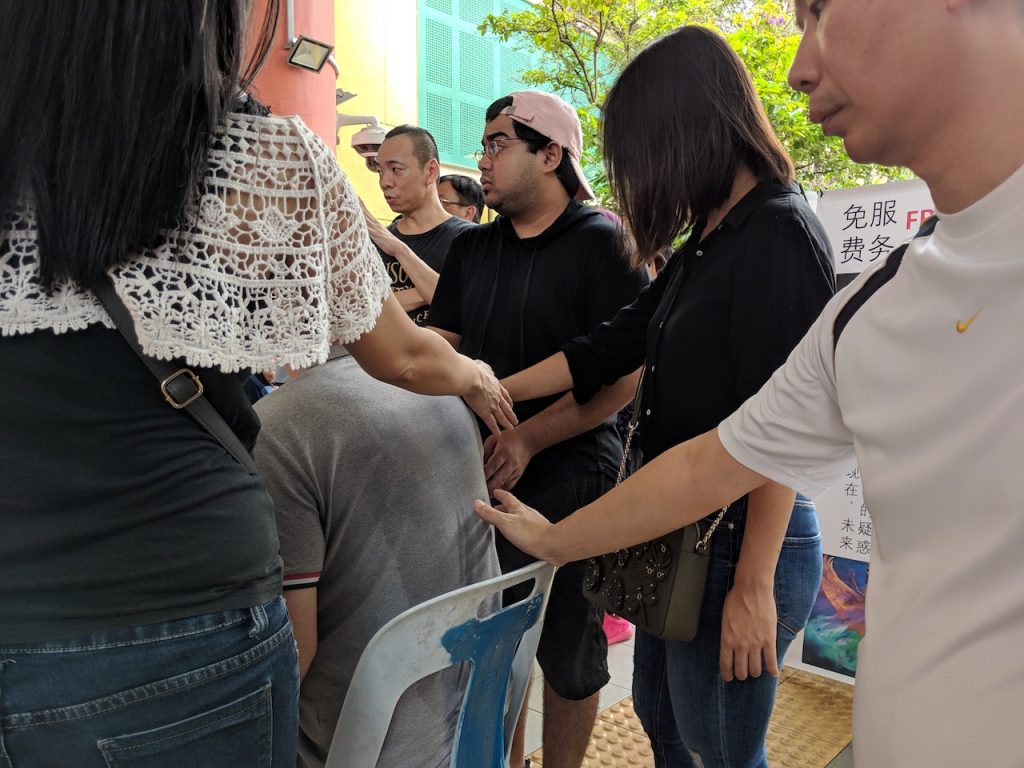
So when Jeff asks me if I’d like to try ‘healing’ an elderly man’s aching shin, I am initially hesitant. I’m certain my overt disbelief would negate the ‘Lord’s work’, and that the misfortune of having a cynic attend to him would ensure that this man wouldn’t be healed.
Yet out of curiosity, I oblige.
Hovering my hand above the man’s shin, my mind momentarily goes blank, having not prayed in years. Thankfully, Jeff jumps in and I mindlessly repeat what he says, like a toddler being taught how to speak.
At the end of our ‘healing’, when the man claims to feel slightly better, I feel both happy and disappointed at once. He might be telling the truth, but my gut fears it’s merely a placebo effect.
Over the two Sundays that I spend in Chinatown, I talk to about seven people who approached the group to be ‘healed’. Six tell me resolutely that they feel much better or that their aches faded after being prayed over. Most weren’t Christian or religious, simply curious and open-minded.
As I’m ready to wrap up my second Sunday, an elderly man, whom I observe for a good 20 minutes from a distance, is finally done with his ‘healing’. So I decide I might as well ask if he feels better before I leave.
In broken Mandarin, he grumbles, “Who would dare to tell them it didn’t make a difference right?”
Then he shoos me away and hobbles off.
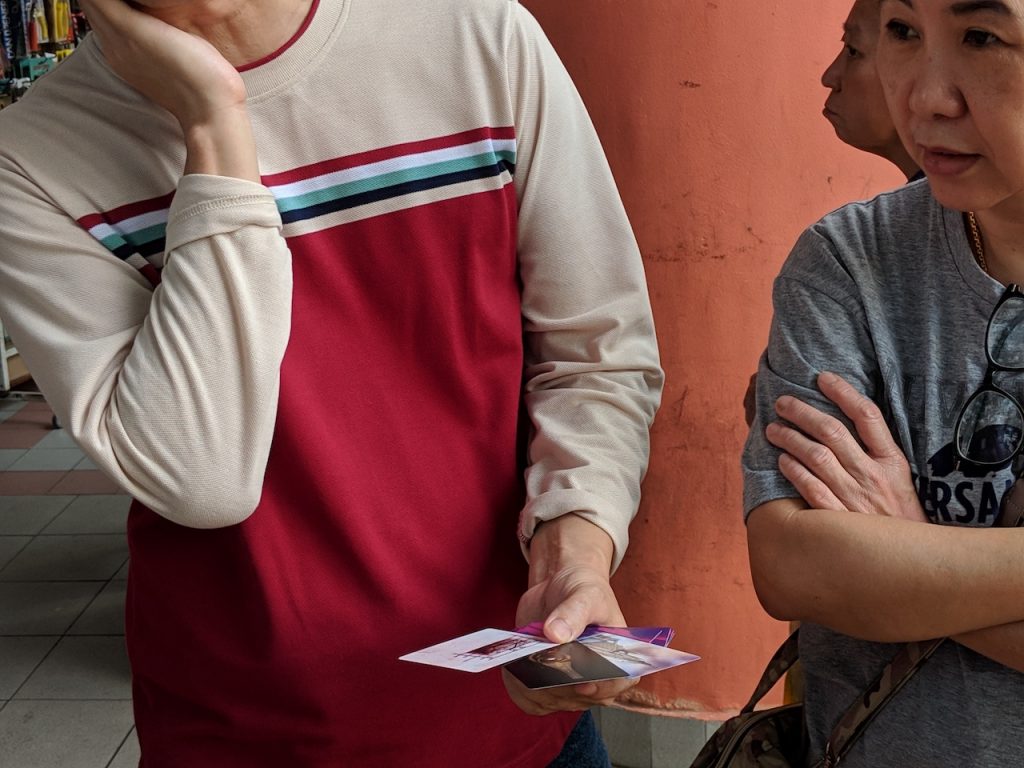
Before even coming to Chinatown, I had already known that Soakability is often branded a cult by traditional Christians. Anyone less critical would buy this label, but for me, it seems a convenient excuse to brush aside a religious practice or philosophy that doesn’t align with one’s own.
On those Sundays, however, I discover that the ‘cult’ label partly stems from Soakability’s use of prophetic tools to help people encounter God, such as the Harvest Revivalist Toolkit. These are cards “designed for evangelism”, not unlike fortune telling or tarot cards. Depending on which card one draws, they contain certain messages from God for the individual pertaining to their life.
Again, my curiosity takes over, so I agree to give it a go.
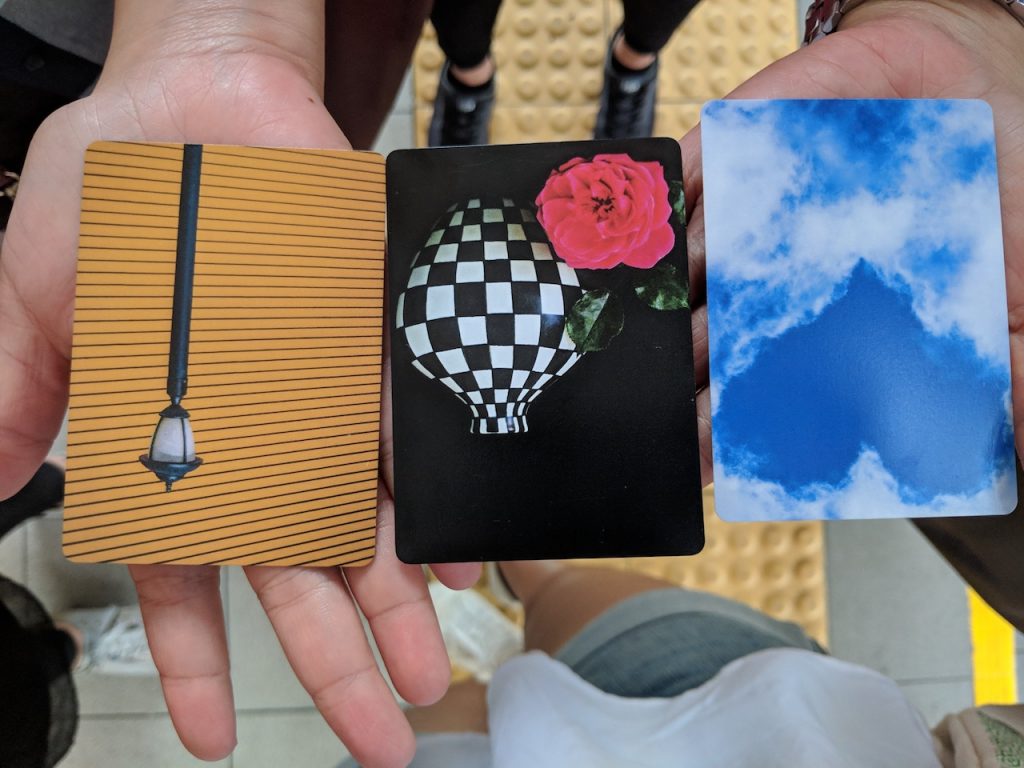
From this, I learn:
A) The pink flower is a sign that I’m blooming exactly the way God wants me to; I am to be patient, because my life is going exactly the way he planned.
B) The solitary lamp post means I am born to stand out so I shouldn’t try to fit in.
In addition to the messages from the cards, I’m told that I’m someone who struggles with balancing my desire for social justice with my need to be objective, and my emotions with my logic. I also learn that my work will create a “ripple effect” where social policy is concerned.
The church member who’s doing my ‘reading’ asks, “Does New York mean anything to you?”
“Sure,” I reply. It’s my favourite city.
She shares that God is telling her that he sees New York in my future, in some form or other. Before I can stop myself, a wry laugh escapes my mouth, and another church member lightly lays her hand on my back.
“I heard a bit of cynicism in your laughter,” she smiles. “You know, sometimes when God wants to send us good things, we should just be open to accepting it.”
Don’t get me wrong. All of this is reassuring, and I find myself grateful for a sudden, renewed sense of confidence. But it doesn’t make me believe in the holy spirit any more than I previously did.
If anything, all I’ve encountered is an astute church member who knows how to read strangers, and extrapolate certain broad personality traits that apply to people who become journalists and writers.
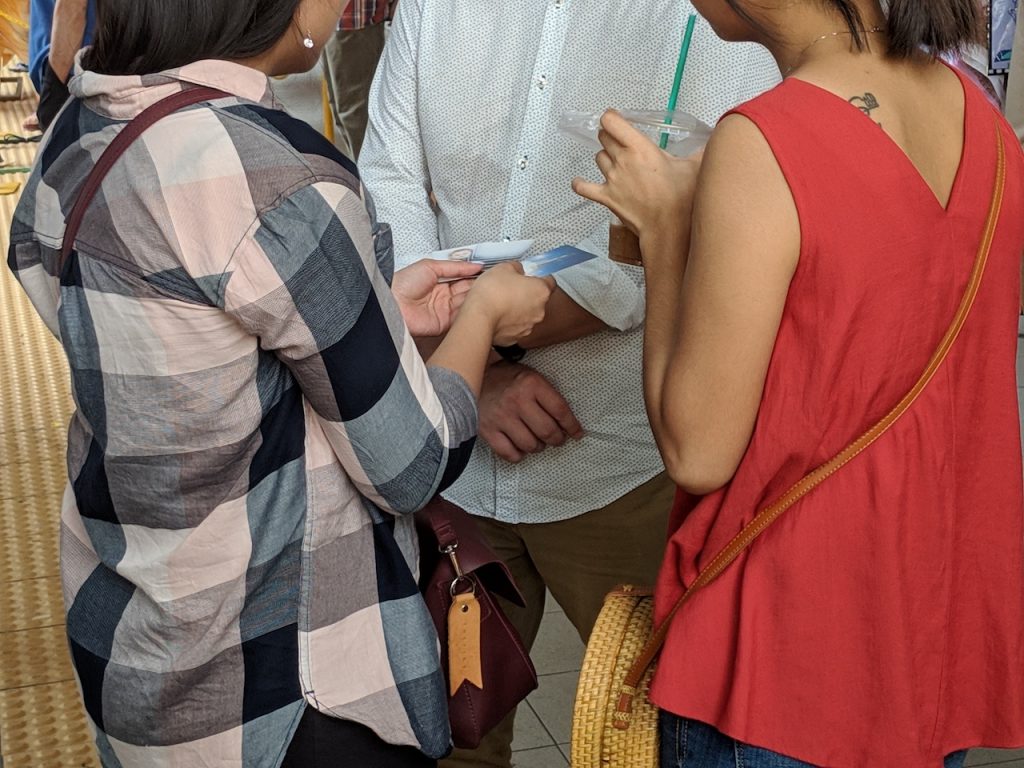
Still, after an hour, I have grown to feel at ease with the group. It helps that one of the members, Ling, opens up about her story of having come from a conservative church and a staunch Christian family. Her whole life, she’d often felt shame and condemnation from this exact community that had constantly preached about love and acceptance.
Then, two years ago at 56 years old, she discovered Soakability, and saw the light.
“When I first came to Soakability, I had to unlearn a lot of stuff that religion taught me previously. I stepped out of my comfort zone and made mistakes that would have made the old me want to hide. Now I am able to go forth more confidently and boldly,” she says.
“My life has changed radically. My daughter left religion, but I still love her and embrace who she is unconditionally.”
Ling’s nose gets red and she takes a deep breath.
“I have many ‘darlings’ at Soakability around my daughter’s age. They help me be a better mother to my daughter,” she quietly adds.
I get the sense that in both her personal and spiritual life, Ling has been lost her whole life. Similar to the way home ministries appear to focus on helping Christians establish a more authentic relationship with religion, a smaller church like Soakability helped her reconnect with herself and God. She informs me that God “is not about numbers, he is about kingdom”; he takes broken people and uses them to transform the world.
Unlike her supposed old self, the Ling I meet is motherly and self-assured. This version of Ling also empathises with my previous struggle to reconcile my Christian upbringing with my rooted disbelief in the religion now, never once suggesting that I am ‘wrong’ or ‘misguided’.
So when she asks if she can pray for me, I concede. Asking twice if I felt the Lord move through me, I shake my head and tell her I honestly don’t. I feel nothing.
“It’s okay,” she smiles, gently patting my arm.
We’ve gotten comfortable enough with each other that Ling asks if she can give me a hug before I go. Against my will, I readily collapse into the arms of someone who was barely a stranger two hours ago. I thank her for her willingness to let me into her troubled past, telling her our conversation provided a good respite from my own troubled year.
When we pull apart, Ling isn’t the only one with a wet face.

I started writing this story to find out if there were a rise in home ministries, and if these provided more opportunities for Christians who were looking for more intimate communities to grow in their faith. The answer, I now know, is yes.
Subconsciously, I also wanted to find out if I would maintain the same level of hostility for home ministries that I hold towards traditional churches. I half expect my answer to be yes; after all, we’re still talking about the same religion.
But after spending time with Soakability and getting to know Jeff and Ling, against my better judgement, my answer is no—I’m not as opposed to the idea of home ministries.
In an increasingly uncertain world, religion continues to offer many the support and comfort they need. Yet they face a problem when mainstream, organised religion doesn’t align with their increasingly progressive values and beliefs.
In their search for a space that’s less rigid, judgmental, and dogmatic, they’ve simply discovered the salvation that communities like home ministries provide.
No matter what we want to tell ourselves, religion is not just about God. For many of us, it’s also about conversations and community; connection and compassion for each other. In the end, all of us just want a place to belong.
So while I’m still not convinced that God exists or that religion will ever be for me, my faith in people has been undoubtedly renewed.
Have you carved out your own space to explore religion through more progressive methods? Tell us how: community@ricemedia.co.

